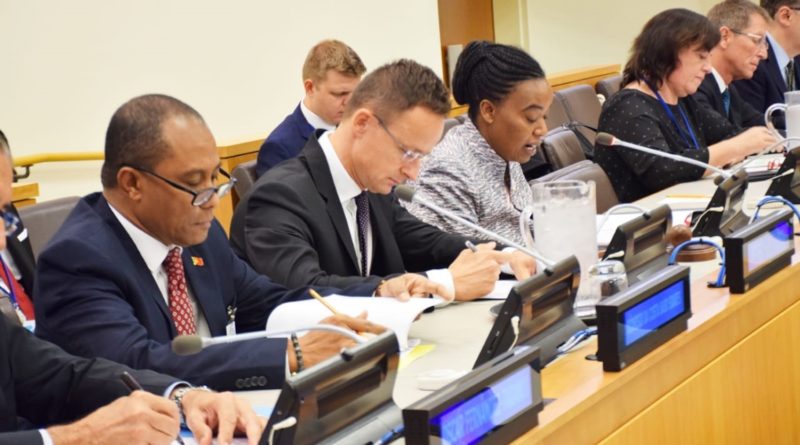Peace Agenda Must be Prioritized, CS Monica Juma
Foreign Affairs Cabinet Secretary Amb Monica Juma convened a high level ministerial meeting to discuss how countries are leveraging their capacities to advance peace commitments on the sidelines of the 74th session of United Nations General Assembly in New York. Amb Monica Juma said, it is only through peace that the world can be more secure, prosperous and equitable.
“Peace must be the norm and not the exception which governments and authorities having the primary responsibility to coherently drive and direct the people-defined peace priorities strategies and programs that contribute to peace”.– Amb Monica Juma
The CS noted that peace is the most prized public good yet remains elusive to many. “Despite Africa being resource endowed, the continent has generally not been able to enjoy sustainable peace and stability for decades due to a number of challenges comprising armed conflicts and political crisis resulting from governance deficits. Other security dilemmas include organized transnational crimes, non-state armed groups, piracy, terrorism, violent extremism and radicalization”. However, she noted a grimmer of hope in the continent driven by existing home based solutions.
“In Africa there is a shift from the conflict- narrative where the continent is increasingly owning and meeting its own development and security needs and said its high time when the continent should focus on positive values including the notion of peace”. — Amb Monica Juma
She said the positive trajectory that is taking shape is underpinned by the growing ability of many countries in the region to organically manage political transitions in ways that are consistent with constitutional and legal requirements. The trajectory is also informed by the recognition that addressing the drivers and root causes of the absence of peace and security includes strengthening capabilities to meet both development and security needs. The launch of the AU Post-Conflict Reconstruction and Development center in Cairo will play a significant role in this narrative shift.
She underscored that peace and security is at the center of Kenya’s Foreign Policy which has given Kenya a grip as a frontline state in the fight against terrorism and violent extremism and remains steadfast in building partnerships for a strategic and operational approach to prevent and combat terrorism and violent extremism.
“As a country, part of our delivering on peace includes a commitment to build bridges and work closely with our neighbors, regional organizations, and international institutions including the United Nations”. Kenya contribution to the UN Peacebuilding commission cannot be understated.
In terms of translation of peace agreements to sustainable and implementable frameworks, Kenya has maintained her role as an anchor state and guarantor for regional peace and security especially with regard to prevention and resolution of conflicts, peace negotiations, peace-building, peacekeeping, humanitarian response and post-conflict reconstruction. As a country Kenya has played a critical role in all peace processes in the region and remain the guarantor of the Comprehensive Peace Agreement (CPA) as well as Agreement for the Resolution of Conflict in South Sudan (ARCSS). Our contingent in AMISOM continues to professionally implement its mandate of degrading Al Shabaab and facilitating the political processes in Somalia.
She said delivering on peace also includes delivering on humanitarian work which Kenya has contributed immensely to the region by hosted over 600,000 refugees with some of them now moving to third countries to work or have gone back home. She reaffirmed the role women and youth continue to play as agents of peace, security and development. “As a country we have put in place structures and instituting and implementing constitutional, legal and administrative measures that ensure all groups of people actively participate in their choice of leaders and have equitable access to state resources including infrastructure”.
The side event moderated by Dr Youssef Mahmoud, Senior Adviser, International Peace Institute (IPI) brought together ministers from the UN member states, observers and civil society organizations.

